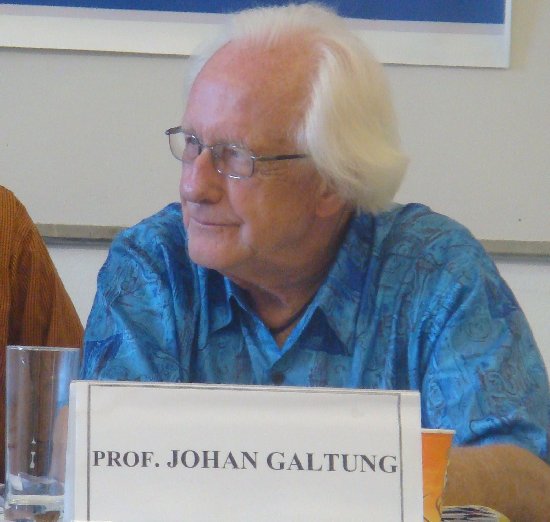2001 | Peace.ca | By Danny Schechter
Covering Violence: How Should Media Handle Conflict?
Johann Galtung seems like the quintessential professor: his white hair is a bit long, his conversation laced with academic phrases, often asserted with the certainty of someone who has integrated the keen insights gained during direct intervention in wars and conflict into a lifetime of scholarship. His commanding persona inspires awe and argument.
Galtung is a professor of Peace Studies, a discipline that sounds strangely archaic in these times, conjuring up peaceniks and hippies going to San Francisco with flowers in their hair. But there is nothing airy-fairy about this no-nonsense Norwegian, who has been traipsing around the world for years with a network called Transcend. This group of academics, researchers and traveling conflict-solvers may sound out of fashion, but is deeply engaged with some very practical initiatives that help parties to conflicts resolve their differences.
Galtung has now turned his gaze on how journalism and the media actively contribute to the misery and violence of the world. And he is filled with ideas about what to do about it.
Like many gurus, Galtung has inspired followers, in this case a group of real-world journalists who are exploring how his ideas might be injected into the insular world of media, where the often unexamined notion of objectivity is worshipped uncritically and its disciples are rarely open to new ideas and ways of viewing the world.
Spurred by Jake Lynch, a TV journalist with Rupert Murdoch’s Sky News, a new initiative, Reporting the World, is challenging one-dimensional war and conflict reporting, offering concrete alternatives rather than mere (if solid) criticism. Jake is the driving force behind the initiative, a MediaChannel-affiliate, which has been holding a series of seminars in association with the Freedom Forum in London and the Conflict and Peace Forums at Taplow Court, a Buddhist center outside of London on an estate graced by a statue of King George III (remember that conflict?). The seminars have attracted prominent U.K. and international editors and reporters willing to debate objectivity and balance in reporting.
I just returned from the latest two-day forum, where Galtung’s ideas were alternatively embraced and dismissed by a diverse group that included a former government spokesperson, a foreign editor at the BBC and the Sunday Times’ foreign correspondent of the year. I kept wondering if this discourse would even be possible in the U.S. Would mainstream media mavens be willing to discuss their practices and listen to critics? Perhaps. But the real question is, will discussions like this change anything in terms of how stories about conflicts are framed and phrased?
12 Points Of Concern:
Galtung laid out 12 points of concern where journalism often goes wrong when dealing with violence. Each implicitly suggests more explicit remedies.
1. Decontextualizing violence: focusing on the irrational without looking at the reasons for unresolved conflicts and polarization.
2. Dualism: reducing the number of parties in a conflict to two, when often more are involved. Stories that just focus on internal developments often ignore such outside or “external” forces as foreign governments and transnational companies.
3. Manicheanism: portraying one side as good and demonizing the other as “evil.”
4. Armageddon: presenting violence as inevitable, omitting alternatives.
5. Focusing on individual acts of violence while avoiding structural causes, like poverty, government neglect and military or police repression.
6. Confusion: focusing only on the conflict arena (i.e., the battlefield or location of violent incidents) but not on the forces and factors that influence the violence.
7. Excluding and omitting the bereaved, thus never explaining why there are acts of revenge and spirals of violence.
8. Failure to explore the causes of escalation and the impact of media coverage itself.
9. Failure to explore the goals of outside interventionists, especially big powers.
10. Failure to explore peace proposals and offer images of peaceful outcomes.
11. Confusing cease-fires and negotiations with actual peace.
12. Omitting reconciliation: conflicts tend to reemerge if attention is not paid to efforts to heal fractured societies. When news about attempts to resolve conflicts are absent, fatalism is reinforced. That can help engender even more violence, when people have no images or information about possible peaceful outcomes and the promise of healing.
There is a lot of food for thought in these ideas, and Lynch and his partner, another TV reporter named Annabel McGoldrick, flesh them out with specific examples, case studies and dissections of how TV has covered a number of events: conflicts in Iraq, the Balkans, the Democratic Republic of the Congo and Indonesia.
They also seek out ideas for developing new ethical frameworks for covering the world, with their accent firmly on the practical choices facing reporters and editors. Lynch has demonstrated how this works in pieces published on MediaChannel (“The Middle East — War Journalism and Peace Journalism” and “Reporting The Peace Journalism Way“), showing that the same story can be covered legitimately in different ways — some that perpetuate a conflict and others that suggest how it might be resolved.
Lots of frustration was expressed when some working journalists felt defensive or contemptuous of critics who were not really familiar with their work cultures and the pressures they face. The healthy back and forth suggested that seminars like this provide a needed forum, missing in the hectic environments in which many of us work, for more reflection about how journalists work and what journalism is for.
Also fascinating was the realization that many journalists need support and even psychological counseling after being traumatized in dangerous assignments. We are not unscathed by conflict reporting. One participant, an editor at the BBC World Service, actually became a psychoanalyst on the side and is now working with colleagues. It is not surprising that when journalists are personally affected by what they see, they tend to become more compassionate toward the suffering of others.
A personal engagement with reporting conflicts can also bring anger and frustration when media companies decline to publish or air reports on human suffering. There were journalists at the seminar who were still outraged that their hard and dangerous work, exposing atrocities in Sudan or the genocide in Rwanda, had encountered huge problems getting published or being seen. Linda Melvern, author of the revealing “A People Betrayed: The Role of the West in Rwanda’s Genocide” (Zed), denounced the declining commitment to investigative reporting in many news outlets. Others were depressed and enraged by the way the media system devalues their work. Many spoke against institutions like the BBC, where a historic “mission to explain” has given way to “docu-soaps” and programs designed to be more “accessible” (i.e., parochial and dumbed down). This directly connects to the issues under discussion because so many channels are cutting back on global coverage and explanatory journalism.
While we were meeting in the luxury of a beautiful suburban London setting, so-called race riots were going on not far away in the city of Bradford, England, where Asian youth were reacting often violently but also in self-defense to police abuses and provocations by racist skinheads and neo-Nazis from the British National Front. When we discussed coverage of a similar incident in Oldham, England, a few weeks back, it was clear that the media were not fully investigating the police role. (The police in some instances train media workers in how to cover riots, contributing, in the view of one BBC producer in the seminar, to complicity between journalists and the police, although after the events TV news outlets refused to turn their footage over to police investigators.) Nor were the actions of fascist groups exposed. Little attention was paid to the deeper causes of the uprising, among them social and economic inequalities like poverty and injustice.
Suddenly the coverage of conflicts and their resolutions was no longer abstract or simply occurring “over there, ” in the “nasty Balkans” or “intractable Middle East.” Social violence had come home, and British journalism was now challenged to report it.
Suddenly, Reporting the World was around the corner.
And perhaps, if media-makers heed the lessons of the good Dr. Galtung, they just might learn to do a better job of making sense of what’s happening.



 RSS
RSS











How Should Media Handle Conflict? #media #israel http://j.mp/bRChfF
RT @CrethiPlethi: How Should Media Handle Conflict? #media #israel http://j.mp/bRChfF